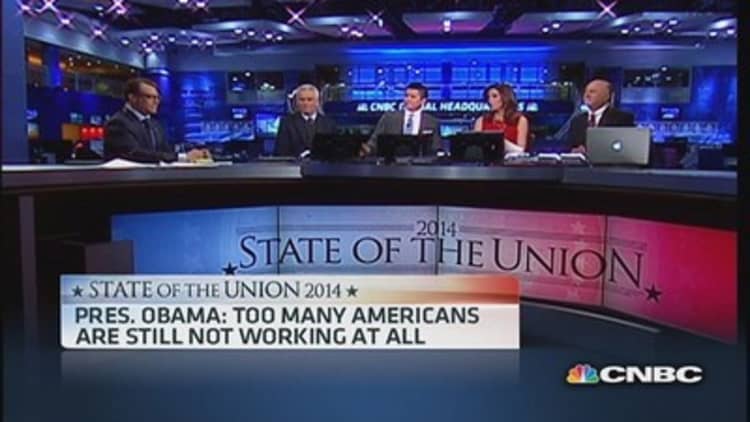It's been a tough day for the wealthy. Stocks are plunging. And America is losing one of its patron saints of wealth creation—.
Bernanke, of course, helped all many parts of the American economy. But the surge in stock markets and asset prices driven by quantitative easing helped the wealthy more than the rest. And you can see from Monday's falling markets why the wealthy will miss Ben the most.
A new Gallup poll asked Americans whether they approve of Bernanke's performance as Fed chairman. Only 40 percent approved, while 35 percent disapproved and 25 percent had no opinion.
But the poll is more revealing when the respondents are divided by income groups. Among those making less than $24,000 a year, 34 percent approved and 36 percent disapproved. The numbers were similar (36 percent and 34 percent respectively) for those making between $24,000 to $60,000.
(Read more: The top three myths about income inequality)
But among the highest income group measures—those making $90,000 or more a year—Bernanke was far more popular.
Fully 54 percent of those high earners approve of Bernanke's performance. Only 35 percent disapproved.
Of course, there could be many reasons why the top earners rate his performance higher. They may be better informed than the rest of the population. While 30 percent of the lowest income respondents had "no opinion" about Bernanke, only 11 percent of the top income group had no opinion.
(Read more: Are the 1% starting to overreact?)
And just because those at the top rate his performance highest doesn't mean he helped them most. Surely the Fed never intended its policy to increase inequality. Janet Yellen and others argue that Fed policy has helped all of America, especially through the housing market.

As she told Time magazine, the effect of the Federal Reserve's bond buying "comes through higher house and stock prices, which causes people with homes and stocks to spend more, which causes jobs to be created throughout the economy and income to go up throughout the economy."
But a growing body of research suggests that quantitative easing has helped those who own stocks more than it's helped those who rely solely on homes or jobs for their wealth. Just look at last year's stock market gains compared to housing or employment gains.
(Read more: Work hard, get rich—Americans don't buy it)
And since the top 10 percent of Americans own more than 80 percent of stocks, those gains have gone largely to the top.
Many will be thanking Bernanke for his service; but none more so than the wealthy.
—By CNBC's Robert Frank. Follow him on Twitter @robtfrank.
Watch "Secret Lives of the Super Rich" Wednesdays at 9 p.m. ET/PT.|http://superrich.cnbc.com.


